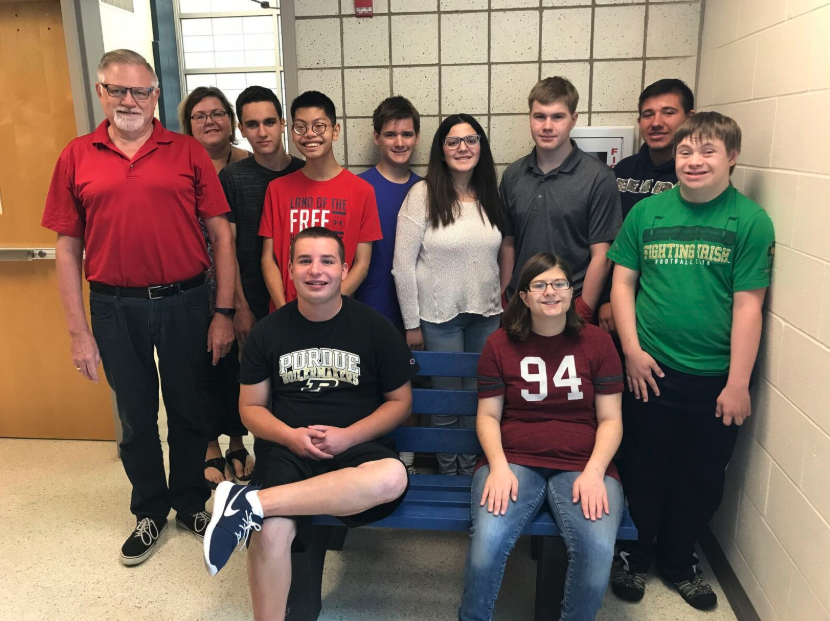CHS Teacher, Students Inspire Buddy Benches to Encourage Open Communication
Luther Lofland, a Special Needs & Basic Vocational Education teacher at Carmel High School who was diagnosed with lymphoma of the skin, is getting a lot of help from his buddies through the school’s Buddy Bench.
“I was diagnosed with lymphoma of the skin, at which time I was also researching the subject on the internet,” Lofland says. “I found where various organizations had started to recycle bottle caps as a different type of fundraiser to be able to provide Buddy Benches for different organizations.”
Lofland took the concept and turned it into an educational experience for his students.
“My students are a part of a vocational program to learn real-world skills as well as academic skills,” Lofland says. “These students are cognitively challenged, yet can master some work skills in order to be employed within the community. Many of my students first volunteer at some business or non-profit, and then later are placed in a job setting in which they are an employee of a business earning minimum wage or higher.”
Lofland took the Buddy Bench and bottle cap ideas and “thought we would collect bottle caps for a short period of time, and then donate them to a school who was attempting the same project to teach the concept of gift giving to a charity. We did so well in collecting bottle caps, that we decided as a class to try and collect 200 pounds of various bottle caps and lids to earn our own bench.”
The bench is located in Lofland’s classroom.
“It will (later) be moved into the hallway on the third floor of the Freshman Center, where my classroom is located,” Lofland says.
The bench is made out of all types of bottle caps, such as soft drink and water bottle caps, as well as other items, including Cool Whip type lids, caps from a large orange container and kitty litter containers.
“The lid also had to have the recycling triangle on the lid somewhere,” Lofland says. “Green Tree Plastics of Evansville is the company that recycles the caps.”
Lofland, who is in the Functional Academics program, has used the bench a lot.
“I have used it in the classroom when I have a student come to my desk, and I say something like, ‘Have a seat and let’s talk,’when I can tell they need to talk about something on their mind, whether positive or negative,” he says. “I also use it for the students to come sit on the bench and talk to another student. Most of my students lack social interaction skills, so the students can sit on the bench and talk to another student, as well as staff. This creates the opportunity to interact appropriately with someone else in the classroom.”
In the classroom, the students know it is a place of conversation, not just a place to sit.
“This concept is an intentional strategy on my part to create interactions with one another,” Lofland says. “Another personal belief on my part is that educational experiences must be intentional in the environment where the skills will be used. This project afforded a perfect learning environment.”
The Carmel High School staff and students were the primary bottle cap collectors.
“As a part of my Basic Vocational Education class, the students were sent out to collect caps and lids from various teachers who indicated they needed their caps picked up,” Lofland says. “I role played with my students the expectations of approaching a teacher, or other adults, and what to say when they arrived at the teacher’s door and then the appropriate ‘thank you’ conversation. One of my teaching philosophies I believe is, ‘I get from my students what I expect from my students.’ I have very few rules in the classroom, only expectations.”
The project also included developing greater social interaction skills with other adults, counting and recording who collected the most lids or caps into a data table and, most importantly, the math concepts.
“The math concepts included counting, sorting and organizing by one hundreds to make a group of thousands,” Lofland says. “The concepts of graphing were a big part of using a data table based on the number of caps the various students brought to math class. The data from the data table was used to create line and bar graphs on the X and Y axis.”
A few students used the counting process to work on improving physical limitations due to hand or finger impairments. They also had to place the caps on a grid with numbers one through 25, thus translating into the concept of money.
“As you can see, this was not just a project to collect caps and lids to give to a charity,” Lofland says. “It developed into something even larger, a project exceeding the expectations from the time it was presented.”
There was a processing fee that was required to be able to earn the bench along with the 200 pounds of caps and lids.
“Two hundred bottle caps filled up the back of my Kia Soul, barely able to close the hatch,” Lofland says. “I personally paid the $180 for the processing fee for the first bench. A second bench has been ordered, and this bench is being funded by Allegion, a major business in Carmel who heard of the project and wanted to support our project.”
Lofland says that students and staff will collect bottle caps until December.
“At that time, I hope we have enough lids and caps for a third bench,” he says. “Any caps we collect after December will be donated to another group within the Carmel Clay Schools.”







Comments 1
5